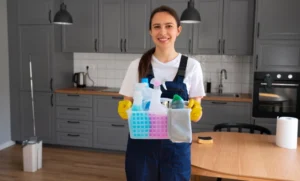Table of Contents
- Introduction
- What is Domestic Worker Sponsorship Transfer?
- Who Can Sponsor a Domestic Worker in Dubai?
- Key Legal Requirements for Sponsorship Transfer
- Step-by-Step Process for Sponsorship Transfer
- Costs and Timelines Involved
- Common Challenges and How to Avoid Them
- How Imdad Center Dubai Supports Employers
- Frequently Asked Questions
- Conclusion and Next Steps
Blog|06 Jul 2025
Domestic Worker Sponsorship Transfer in Dubai: A Complete Guide for Employers

Introduction
For many households in Dubai, a domestic worker is an integral part of daily life. The relationship is built on trust and mutual respect. However, circumstances can change. Your trusted nanny may receive an offer from another family, or you may find the perfect helper who is already employed in the UAE and wishes to change sponsors. When this happens, navigating the sponsorship transfer is a necessity. This guide provides a clear, actionable roadmap for employers. We will walk you through the entire procedure, from initial agreements to final visa stamping, so you can manage the transition with confidence and full legal compliance.
What is Domestic Worker Sponsorship Transfer?
A sponsorship transfer is the official process that allows a domestic worker (such as a maid, nanny, or driver) to legally move their employment and residency visa from a current employer to a new one within the UAE. This procedure is not merely an informal agreement; it is a structured legal framework managed by the Ministry of Human Resources and Emiratisation (MoHRE) and facilitated through government-approved Tadbeer centers.
The purpose of this regulation is twofold: it gives the employer a clear and legal method to hire staff already in the country, and it protects the domestic worker by ensuring their rights, salary, and legal status are maintained throughout the transition. Following the correct procedure prevents fines, blacklisting, and legal issues for all parties involved.
Who Can Sponsor a Domestic Worker in Dubai?
To become a sponsor for a domestic worker in Dubai, an individual or family must meet specific criteria set by the authorities. These rules are in place to confirm that the sponsor can provide a stable and suitable environment for the worker.
- Residency Status:
The head of the household sponsoring the worker must hold a valid UAE residency visa.
- Income Requirements:
The sponsor must demonstrate a minimum monthly salary. In 2025, the typical minimum monthly salary to sponsor a maid in Dubai is AED 25,000. This figure is stricter than in past years and is subject to verification at the time of application. So it is best to check the latest figures with Tadbeer or a service provider like Imdad Center. This confirms the employer's financial capacity to pay the worker’s salary and cover living expenses.
- Accommodation:
Rent or own an apartment in Dubai with at least two bedrooms. This generally means providing the domestic worker with a private, clean, and safe room with adequate privacy.
- Family Composition:
Single individuals may face restrictions, while families are generally permitted to sponsor domestic helpers.

Key Legal Requirements for Sponsorship Transfer
Before initiating the transfer, certain conditions must be met to ensure a smooth process. Missing any of these can lead to application rejection or delays.
- Mutual Consent:
The transfer must be agreeable to all three parties: the current sponsor, the new sponsor, and the domestic worker. The current sponsor’s consent is formalized through a No Objection Certificate (NOC).
- Clearance of Dues:
The previous employer must settle all financial obligations with the worker. This includes the final salary, any accumulated leave pay, end-of-service gratuity as per the contract, and any other agreed-upon benefits. Proof of settlement may be required.
- Valid Documentation:
Both sponsors and the worker must have valid passports and Emirates IDs. The worker's visa should not have expired.
- No Active Bans or Violations:
There should be no active absconding reports against the worker or labor-related violations against either sponsor.
Step-by-Step Process for Sponsorship Transfer
The transfer process is systematic. While a service provider like Imdad Center can handle these steps for you, understanding them is useful for any employer.
- Agreement and Document Collection:
The new employer, current employer, and worker agree on the transfer terms. The new employer collects the required documents, including the NOC from the current sponsor and copies of the worker's passport and visa.
- Application at a Tadbeer Center:
The new sponsor submits the transfer application at a licensed Tadbeer center. This includes submitting all required documents like the new sponsor's salary certificate, Ejari (tenancy contract), and passport copies.
- Medical Fitness Test:
The domestic worker must undergo a mandatory medical examination at a government-approved health center. The test screens for communicable diseases to confirm the worker is medically fit for employment.
- Contract Generation and Signing:
Once the medical results are clear, a new, standardized employment contract is generated through the MoHRE system. This contract outlines the salary, working hours, leave, and other terms. All parties must review and sign it.
- Visa Stamping and Emirates ID:
After the contract is approved, the application moves to the immigration department. The old visa is canceled, and a new residency visa under the new sponsor's name is stamped in the worker's passport. The worker will also complete their biometrics for a new Emirates ID card.
- Wage Protection System (WPS) Registration:
The new employer must register with the WPS and create a process to pay the worker’s salary through this system. This is a mandatory step that creates an official record of salary payments.
Costs and Timelines Involved
Understanding the financial and time commitments helps in planning the transfer.
- Cost Breakdown:
Total fees for a sponsorship transfer in Dubai can range from AED 7,999 to AED 18,000. These costs typically include:
- Government Fees:
Charges for visa application, medical test, Emirates ID, and contract processing.
- Agency Service Fees:
Charges by the Tadbeer center or a service provider like Imdad Center for managing the entire process.
- Medical Insurance:
Mandatory health insurance for the worker for the duration of the visa.
- Government Fees:
Imdad Center offers a package for a two-year maid visa, including insurance and all processing, starting from AED 8,000.
- Processing Time:
A straightforward transfer with all documents in order usually takes between one to three weeks. However, this can be extended by public holidays, delays in receiving the NOC, or if additional document verification is needed.
For official fee structures, refer to the Ministry of Human Resources and Emiratisation (MoHRE) Portal.
Common Challenges and How to Avoid Them
While the process is standardized, certain issues can arise.
- Uncooperative Previous Sponsor:
A previous employer may delay providing the NOC or settling dues.
- Solution:
Maintain clear and polite communication. If issues persist, seek guidance from your service provider or Tadbeer, who can advise on official channels for resolution.
- Solution:
- Documentation Errors:
Incorrect or incomplete paperwork is a common reason for rejection.
- Solution:
Use a checklist and double-check every document before submission. Better yet, have an experienced professional like Imdad Center review the file.
- Solution:
- Failed Medical Test:
If a worker fails the medical fitness test, the transfer cannot proceed.
- Solution:
While not always predictable, it is a risk to be aware of. The application will be halted, and the worker may be required to leave the country.
- Solution:
How Imdad Center Dubai Supports Employers
Navigating the sponsorship transfer process alone can be time-consuming and stressful. Imdad Center, a government-approved domestic staffing agency, provides end-to-end support to make it simple and certain.
Our services include:
- Document Verification:
We ensure all your paperwork is correct and complete before submission to prevent rejections.
- Full Process Management:
We handle every step on your behalf, from Tadbeer applications to coordinating medical tests and Emirates ID appointments.
- Clear Communication:
We keep you updated at every stage and act as a liaison between you, the previous sponsor, and the authorities.
- Compliance Guarantee:
With our assistance, you can be certain that every part of the transfer is handled according to the latest UAE labor laws.
Working with Imdad Center saves you time, removes the guesswork, and gives you the assurance that the transfer is done right.
Frequently Asked Questions
Can I transfer sponsorship for a worker from another Emirate to Dubai?
Yes, it is possible to transfer a domestic worker's visa from another emirate (e.g., Abu Dhabi, Sharjah) to Dubai, but the process may involve extra steps at both emirates' immigration departments.
What is the end-of-service gratuity for a domestic worker?
As per the UAE Domestic Labour Law, a worker who has completed one year or more of continuous service is entitled to an end-of-service gratuity, which is calculated based on their last-drawn salary. The standard calculation is typically based on a number of days' pay for each year of service.
What are my responsibilities as a new sponsor?
As a new sponsor, you are responsible for the worker’s monthly salary (paid via WPS), providing adequate accommodation and food, covering medical expenses through valid health insurance, providing one day of paid rest per week, and respecting the terms of the labor contract.
Conclusion and Next Steps
Transferring a domestic worker's sponsorship in Dubai is a regulated procedure designed to protect everyone involved. By understanding the requirements and following the correct steps, you can ensure a hassle-free transition for your new household employee. A reliable partner can make all the difference.
Ready to start your domestic worker sponsorship transfer with confidence? Contact Imdad Center today for a no-obligation consultation with one of our experts. Let us handle the complexities so you can focus on welcoming your new helper to your home.







